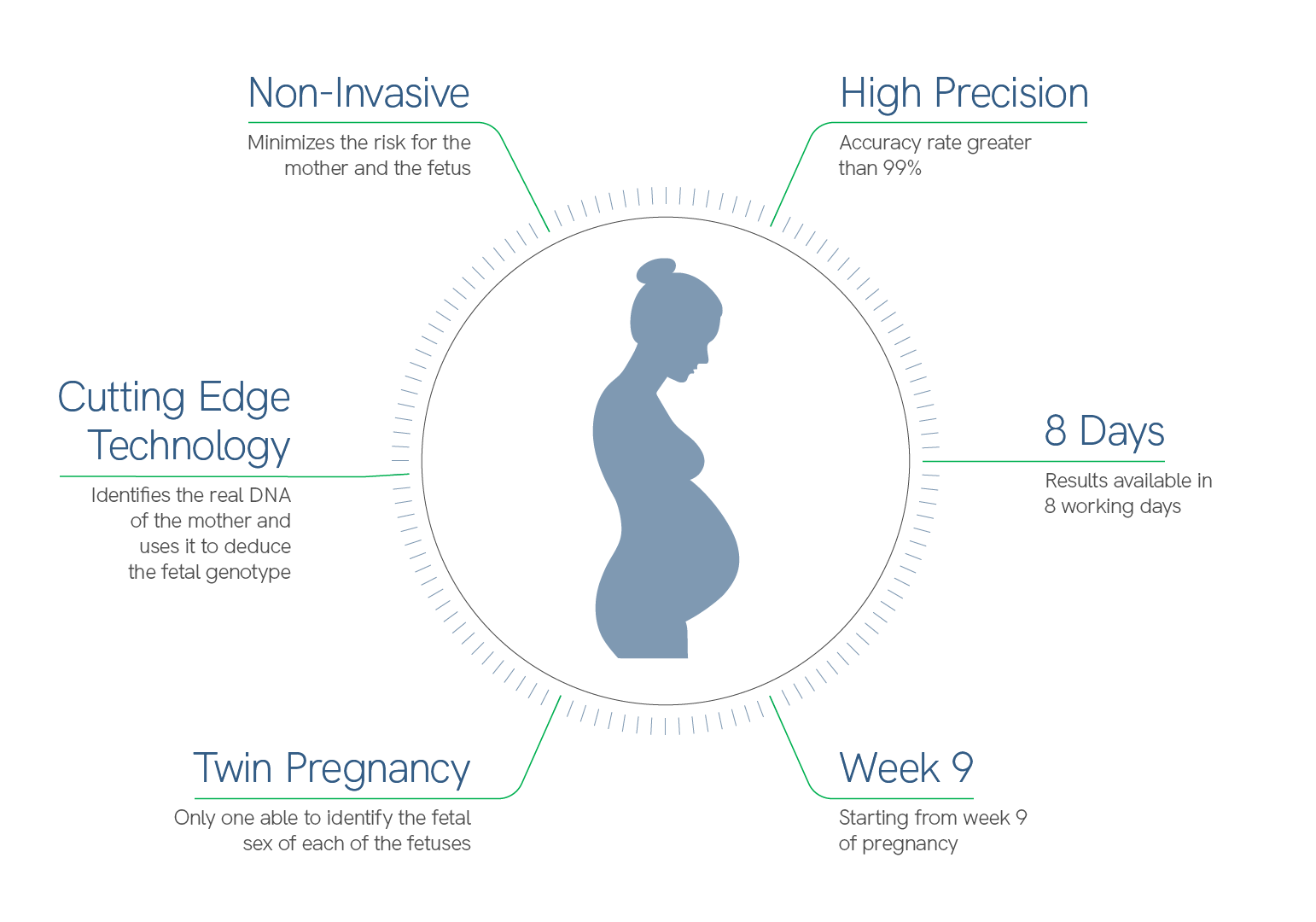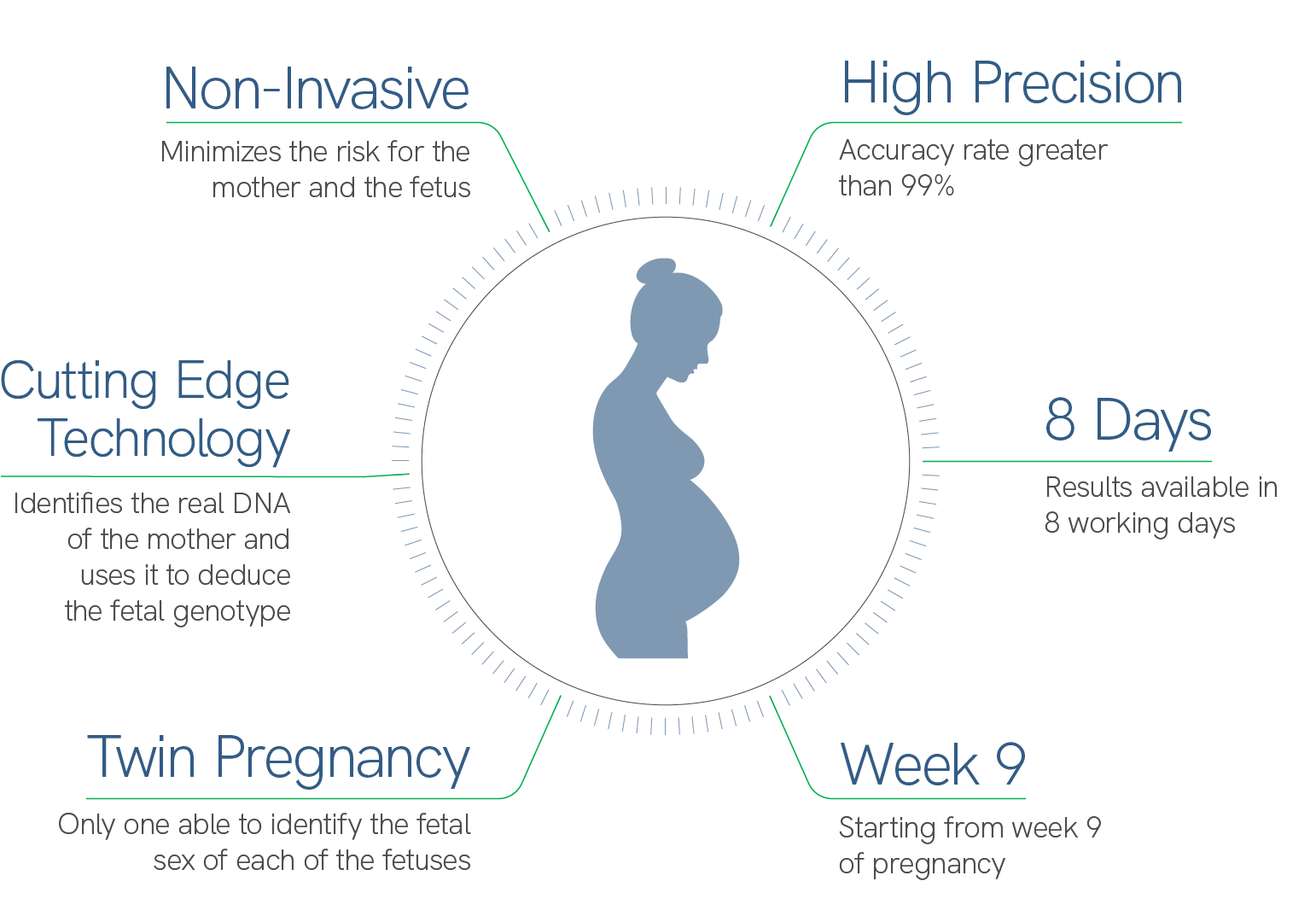Non-Invasive Prenatal Testing
Non-invasive prenatal testing (NIPT) is a blood-based genetic, prenatal screening test of the pregnant mom that screens for common chromosomal conditions that affect a baby’s health.
This non-invasive prenatal testing is indicated to perform a prenatal screening for possible abnormalities in the fetus from week 9 of pregnancy.



Find out more about the NIPT
The Non-invasive Prenatal Test consists of an analysis of the mother's blood to detect abnormalities of the fetus, avoiding performing an amniocentesis and the possible risks that this test entails.
1. Who can take the Non-Invasive Prenatal Test?
This test is indicated for pregnant women of any age from week 9 of pregnancy.
- In the following situations:
· Single or twin pregnancy
· In Vitro Fertilization Pregnancies
· Pregnancy by egg donation
· Vanishing Twin (Missing Twin)
2. What does it detect?
- Down Syndrome (Trisomy 21)
- Edwards' syndrome (Trisomy 18)
- Patau Syndrome (Trisomy 13)
- Turner syndrome (X0)
- Sex chromosomal trisomies:
- Klinefelter syndrome (XXY)
- Jacobs Syndrome (XYY)
- Triple X syndrome (XXX)
- 22q deletion syndrome (optional)
- Four additional microdeletions (optional):
- Angelman syndrome
- Prader-Willi syndrome
- Cri-du-chat syndrome
- 1p36 deletion
- Triploidy (69 chromosomes)
- Fetal sex
3. Delivery and interpretation of results
Delivery time 8 working days. * Sometimes the delivery time may be extended due to technical needs.
Interpretation:
LOW PROBABILITY: It confirms by 99% the probability that the fetus does not present the syndromes analyzed. However, it does not rule out the possibility of fetal chromosomal involvement,
HIGH PROBABILITY: To confirm a HIGH RISK result, a definitive diagnostic test is required on the amniotic fluid. It is important that you consult the results with your gynecologist.
In the following table you will find a brief summary to know the type of Non-Invasive Prenatal Test.
Laboratorio Echevarne always recommend consulting it in advance with your gynecologist.
| NIPT PANEL | SYNDROMES | SINGLE PREGNANCY | TWIN PREGNANCY | ||||
| Natural | Egg donation | Monozygotic | Dizygotic | ||||
| NIPT 390€ | PLUS 530€ | EXTENDED 730€ | Down S. (T21) | YES | YES | YES | YES |
| Edwards S. (T18) | YES | YES | YES | YES | |||
| Patau S. (T13) | YES | YES | YES | YES | |||
| Fetal Sex | YES | YES | YES | YES | |||
| Triploidy | YES | NO | NO | NO | |||
| Sexual Aneuploidies (X0, XXX, XXY, XYY) |
YES | NO | YES | NO | |||
| Microdeletion 22q11.2 | YES | NO | YES | NO | |||
| Microdeletions (Prader-Willi, Angelman, Cri-Du-Chat, Monosomy 1p36) | YES | NO | NO | NO | |||
Non-Invasive Prenatal Test
1.What does it detect?
- Trisomy 21. S. Down:
- Trisomy 18. S. Edwards
- Trisomy 13. S. Patau
- Fetal sex
- Triploidy
2. Type of pregnancy
This test is indicated for pregnant women of any age from week 9 of pregnancy.
In the following situations:
- Single pregnancy
- Single pregnancy due to egg donation: * Triploidy is NOT reported.
- Twin pregnancy: The sex of each fetus, zygosity and fetal fraction are reported.
- Dizygotic twin pregnancy: * Triploidy is NOT reported.
- Monozygotic twin pregnancy: * Triploidy is NOT reported.
3. Interpretation of the results:
Interpretation:
LOW PROBABILITY: It confirms by 99% the probability that the fetus does not present the syndromes analyzed. However, it does not rule out the possibility of fetal chromosomal involvement,
HIGH PROBABILITY: To confirm a HIGH RISK result, a definitive diagnostic test is required on the amniotic fluid. It is important that you consult the results with your gynecologist.
4. Indications.
It is not necessary to come on an empty stomach. It is recommended to eat food 30 minutes before the analysis.
Extractions from Monday to Thursday (The analysis will not be carried out on the eve of Fridays)
- Price 390€
Non-Invasive Prenatal Test PLUS
1.What does it detect?
- Trisomy 21. S. Down:
- Trisomy 18. S. Edwards
- Trisomy 13. S. Patau
- Monosomy X. S. Turner
- Sexual aneuploidies
- Fetal sex
- Triploidy
- 22q11.2 S. Di George
2. Type of pregnancy
This test is indicated for pregnant women of any age from week 9 of pregnancy.
In the following situations:
- Single pregnancy
- Single pregnancy due to egg donation: * Monosomy X, Microdeletion 22q11.2, Triploidy are NOT reported.
- Twin pregnancy: The sex of each fetus, zygosity and fetal fraction are reported.
- Dizygotic twin pregnancy: * Monosomy X, 22q11.2 Microdeletion, Triploidy are NOT reported.
- Monozygotic twin pregnancy: * Triploidy is NOT reported.
3. Interpretation of the results:
Interpretation:
LOW PROBABILITY: It confirms by 99% the probability that the fetus does not present the syndromes analyzed. However, it does not rule out the possibility of fetal chromosomal involvement,
HIGH PROBABILITY: To confirm a HIGH RISK result, a definitive diagnostic test is required on the amniotic fluid. It is important that you consult the results with your gynecologist.
4. Indications.
It is not necessary to come on an empty stomach. It is recommended to eat food 30 minutes before the analysis.
Extractions from Monday to Thursday (The analysis will not be carried out on the eve of Fridays)
- Price 530€
Extended Non-Invasive Prenatal Test
1. Who is it for?
This test is indicated for:
- Pregnancy from week 9.
- For single pregnancy.
* Not indicated for twin pregnancy or pregnancy by egg donation.
2. What it detects?
- Trisomy 21. Down S.
- Trisomy 18. Edwards S.
- Trisomy 13. Patau S.
- Monosomy X. Turner S.
- Sexual Aneuploidies (XXX, XXY, XYY)
- Fetal sex
- 22q11.2 Microdeletion
- Monosomy 1p36
- Cri-du-Chat S.
- Prader-Willi S.
- Angelman
- Triploidy
3. Interpretation of the results:
Interpretation:
LOW PROBABILITY: It confirms by 99% the probability that the fetus does not present the syndromes analyzed. However, it does not rule out the possibility of fetal chromosomal involvement,
HIGH PROBABILITY: To confirm a HIGH RISK result, a definitive diagnostic test is required on the amniotic fluid. It is important that you consult the results with your gynecologist.
4. Indications.
It is not necessary to come on an empty stomach. It is recommended to eat food 30 minutes before the analysis.
Extractions from Monday to Thursday (The analysis will not be carried out on the eve of Fridays)
- Price 730€
Special Cases Non-Invasive Prenatal Test
1. Who is it for?
This test is indicated for:
- Pregnancy from week 10.
- Twin pregnancy from egg donation.
- Pregnancy with evidence of missing twin (from week 16).
- Pregnancy if you have recently received a bone marrow transfusion.
2. What it detects?
- Trisomy 21. Down S.
- Trisomy 18. Edwards S.
- Trisomy 13. Patau S.
- Presence/absence of the Y chromosome is reported
3. Interpretation of the results:
Interpretation:
LOW PROBABILITY: It confirms by 99% the probability that the fetus does not present the syndromes analyzed. However, it does not rule out the possibility of fetal chromosomal involvement,
HIGH PROBABILITY: To confirm a HIGH RISK result, a definitive diagnostic test is required on the amniotic fluid. It is important that you consult the results with your gynecologist.
4. Indications.
It is not necessary to come on an empty stomach. It is recommended to eat food 30 minutes before the analysis.
Extractions from Monday to Thursday (The analysis will not be carried out on the eve of Fridays)
- Price 580€
Benefits
TECHNICALLY SUPERIOR
It detects conditions that other tests cannot, including molar pregnancy, triploidy, and disappearance of the twin.
UNIQUE IN DIFFERENTIATING GENETIC PROFILE
The only test that differentiates between maternal and fetal DNA, helping to avoid false positives and false negatives.
TWIN PREGNANCY
It can assess zygosity (if identical), individual fetal sex, and individual fetal fraction * in twin pregnancies.
NOT INVASIVE
With a simple sample of maternal blood we avoid putting the fetus at risk.
WEEK 9
The test can be done from week 9 of pregnancy.
99% PRECISION
Accuracy rate greater than 99% for the detection of Down Syndrome.




















